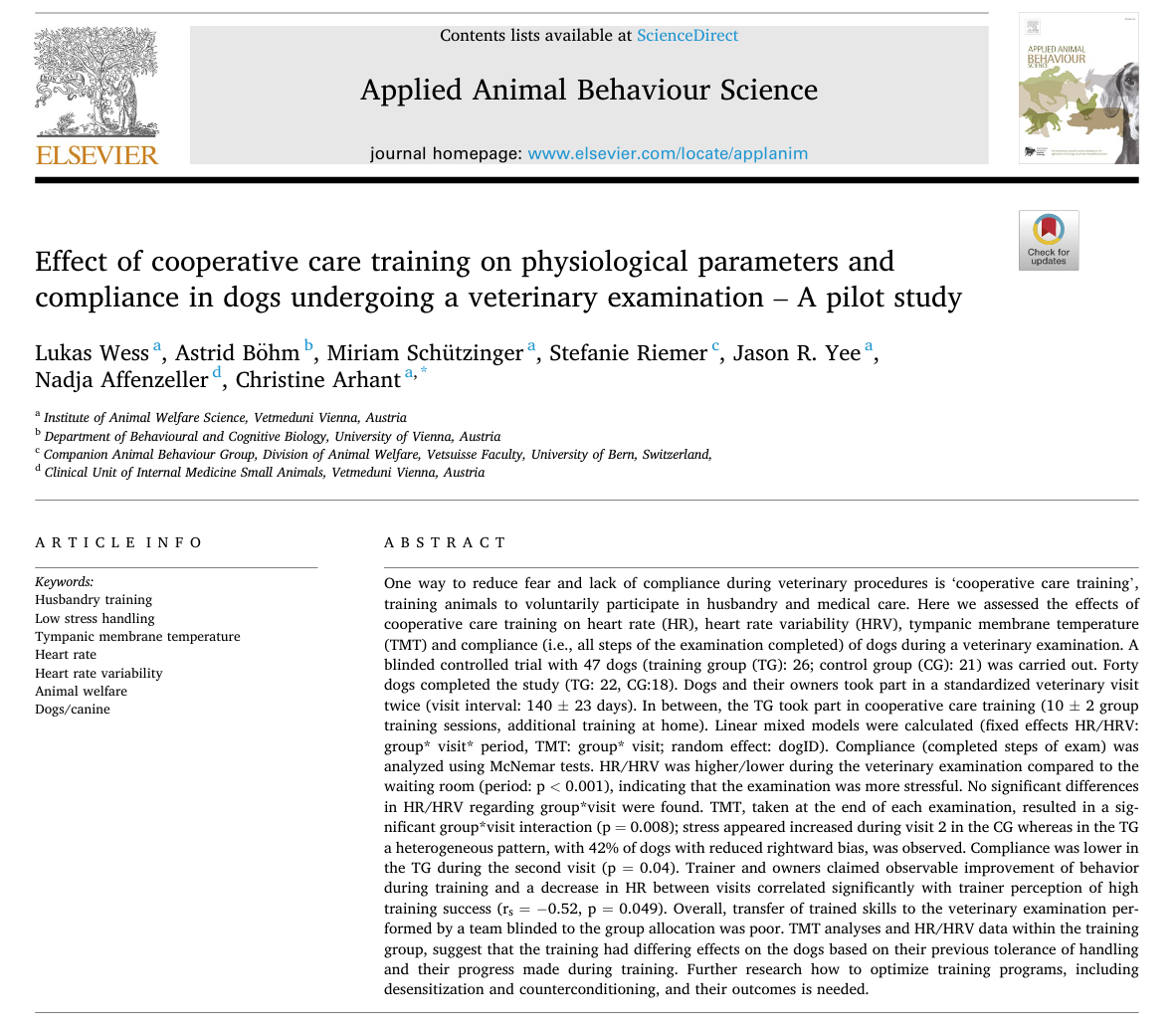Cooperative Care Training for Dogs: The Future of Enhanced Veterinary Experiences for Dogs
Cooperative care training is revolutionizing the way we interact with and care for our animal companions. This approach, rooted in positive reinforcement and trust-building techniques, aims to prepare animals to willingly participate in various husbandry procedures. In the realm of dogs, cooperative care training has garnered considerable attention for its potential to improve their well-being and enhance veterinary experiences. This blog post explores the concept of cooperative care training, its benefits for dogs, and highlights findings from a pilot study on the topic.
Understanding Cooperative Care Training
Cooperative care training involves teaching dogs to actively engage in routine veterinary procedures, such as examinations, vaccinations, nail trims, and grooming, without stress or resistance. Instead of using force or restraint, trainers employ positive reinforcement techniques to shape desired behaviors and create a partnership built on trust and cooperation.
Benefits of Cooperative Care Training in Dogs
Stress Reduction: Cooperative care training can significantly reduce stress levels in dogs during veterinary procedures. By introducing them to these experiences gradually and associating them with positive outcomes, dogs exhibit fewer signs of anxiety, fear, or aggression.
Enhanced Veterinary Experiences: Dogs trained in cooperative care are more comfortable during veterinary examinations, allowing veterinarians to conduct thorough assessments and procedures with greater ease. This improves the accuracy of diagnoses, minimizes the need for sedation or physical restraint, and ultimately leads to more effective veterinary care.
Strengthened Human-Animal Bond: Cooperative care training fosters a stronger bond between dogs and their caregivers. Dogs learn to trust their owners or handlers, as they experience these procedures as positive interactions rather than stressful or unpleasant events.
What Does the Research Say? A Look Into a Pilot Study:
"Effect of Cooperative Care Training on Physiological Parameters and Compliance in Dogs Undergoing a Veterinary Examination"
In a recent pilot study conducted by Wess et al. (2022), the researchers examined the impact of cooperative care training on physiological parameters and compliance (ability to complete veterinary exams) in dogs during veterinary examinations. The study involved a group of dogs that received cooperative care training and a control group that did not.
The cooperative care group participated in 10 group classes focused on a paw targeting consent behavior to be used in veterinary procedures and received homework to practice between classes. The control group received written instructions for two skills (a side-lay and chin rest) that the owners trained them to control for increased human-dog interaction.
The findings revealed some differences between the training group and the control group. Some of the dogs that underwent cooperative care training exhibited a reduced rightward bias of tympanic temperature (which is associated with negative affective states, eg. fear, anxiety, and stress). Additionally, the trainer and owners reported those dogs to have made good improvements in their ability to be handled.
Overall, the dogs in both groups still struggled with the examination procedure. Some suggestions for this were the difficulty in generalizing cooperative care training to the veterinary environment and importantly, the effect of returning to the same veterinary environment for their second exam.
Don’t Be Discouraged! My Takeaways as a Fear Free Certified Professional:
This study is an exciting new examination of the effects of cooperative care training on dogs receiving routine veterinary examinations. I’m not surprised that there weren’t significant differences in physiological data between the two groups, here’s why:
Though owners reported the frequency and duration of cooperative care training at home there wasn’t a measure of how far along in the designated training process they’d reached before the second examination.
Cooperative care training is a lengthy process requiring a ton of generalization (practicing the skills in different environments with different people). There likely wasn’t enough time and practice built into this program.
One of the key tenants of the Fear Free approach is building a positive association with the actual veterinary environment. Not having any prior experience with these skills in this environment and only having a potentially negative experience to draw on likely primed the dogs for fear and stress.
Regardless, this is an exciting new area in the canine behavior world and I’m excited to see future works continue to build upon this pilot study!
References:
Wess, L., Böhm, A., Schützinger, M., Riemer, S., Yee, J. R., Affenzeller, N., & Arhant, C. (2022). Effect of cooperative care training on physiological parameters and compliance in dogs undergoing a veterinary examination – A pilot study. Applied Animal Behaviour Science, 250, 105615. https://doi.org/10.1016/j.applanim.2022.105615


